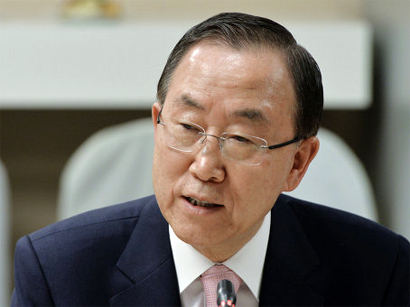Several countries made fresh funding pledges totalling 2.4 billion dollars Wednesday at a one-day international conference aimed at bolstering humanitarian aid efforts in war-torn Syria, dpa reported.
The United Nations had, in December, launched the largest-ever relief appeal for a single emergency, calling for 6.5 billion dollars for Syrians in 2014.
UN Secretary General Ban Ki-moon told the conference in Kuwait City: "Half of the total Syrian population, nearly 9.3 million individuals, urgently need humanitarian aid. Nearly half of them are children."
He said that more than 3 million Syrians had fled to Lebanon, Jordan, Turkey, Iraq and Egypt. "I am appalled by the violence and brutality of this conflict."
The 6.5 billion dollars sought by the UN is more than four times the pledges requested at a similar conference in 2013.
A total of 62 countries as well as 14 UN agencies took part in the conference, the official Kuwaiti News Agency (KUNA) reported quoting Foreign Minister Sheikh Sabah al-Khaled al-Sabah.
The UN and humanitarian agencies have received 70 per cent of the 1.5 billion dollars pledged at last year's conference, the UN agency for refugees said.
Kuwait pledged 500 million dollars at the opening session of the conference. The United States promised 380 million dollars, while Saudi Arabia pledged 250 million dollars and Britain 164 million dollars.
EU countries promised a total of 753 million dollars, Norway 75 million dollars and Qatar 60 million dollars.
More than 2.3 million Syrians have fled their country since the conflict began in 2011, with more than 4 million displaced inside its borders, UN agencies have said.
They are planning for up to 4.1 million refugees by late 2014 - of Syria's pre-war population of 22.4 million.
To address the crisis, representatives from 70 countries and 24 aid agencies gathered in Kuwait to raise billions of dollars in assistance for the displaced.
The Britain-based Syrian Observatory for Human Rights estimates that at least 130,000 people have been killed since 2011.
The UN earlier this month said it had stopped counting the victims, citing inability to access to the conflict zones to verify the figures. In July it put the death toll at 100,000.
Meanwhile, jihadist leaders in Syria called for a ceasefire among rival Islamist rebels, who have been locked in fierce fighting for almost three weeks.
Abu Omar al-Halabi, a field commander in the al-Qaeda-linked al- Nusra Front, called on Islamist groups to end their infighting, which has reportedly killed more than 500 people.
"We must all return to the greater goal of defeating the regime and establishing an Islamic state in Syria," said al-Halabi, who is based in the embattled city of Aleppo in northern Syria.
His plea came one week after the chief of the al-Nusra Front, Mohammed al-Jolani, urged the Islamic State in Iraq and the Levant (ISIL), another al-Qaeda-affiliated group, to reach a ceasefire with rival rebels.
Leaders of the regional jihadist movement echoed al-Halabi's calls, warning Islamist fighters against being "manipulated" by what they claimed is a "conspiracy" instigated by the Syrian regime and foreign powers to prolong the infighting.
"There have been some individual mistakes made by (ISIL), but these are being highlighted and manipulated by the media and foreign agendas to encourage a schism," said Saad Hneity, the leader of the Jordanian jihadist Salafist movement.
Despite the calls for a truce, violence reportedly spread across northern Syria as ISIL and a coalition of rival Islamist groups continued their back-and-forth battle for control of areas captured from government forces.
Activists based in Syria reported that ISIL militants seized full control of the north-eastern city of al-Riqqa on Wednesday after the summary execution of more than 100 rival jihadists and two days of street battles.
Attacks by ISIL on rival rebel groups in recent months as well as kidnappings of opposition activists have led to widespread anger against the group.
Syria's conflict has seen several radical groups impose strict Islamic rule in areas under their control, triggering fears that the country is turning into a hotbed of Islamist militancy.
The Syrian uprising started in March 2011 with anti-government protests, but descended into civil war after President Bashar al-Assad's regime sought to quell the demonstrations with violence.






